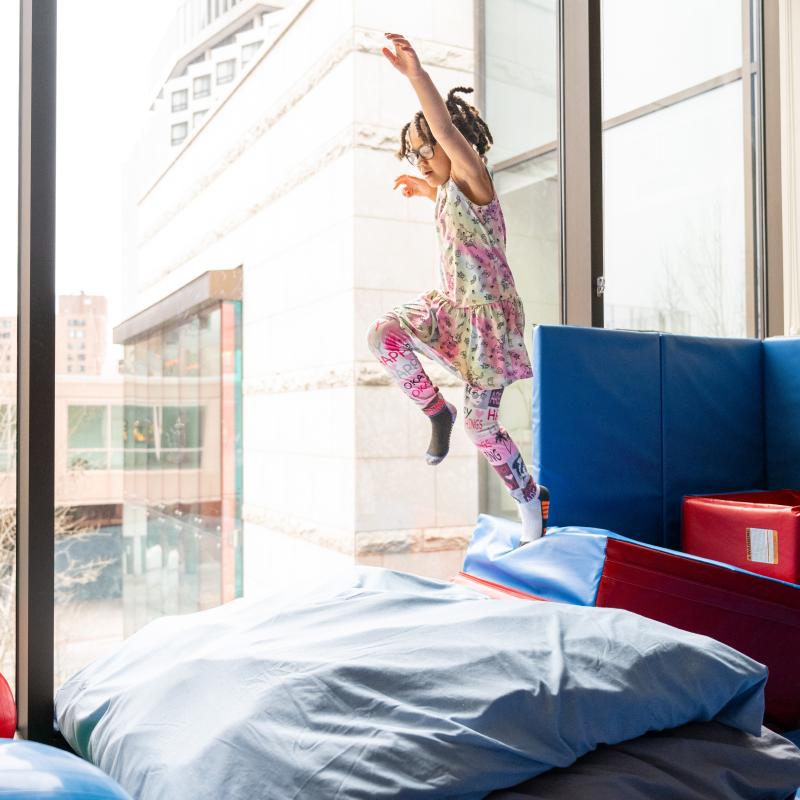A nurturing space where children heal and grow.
A healing-centered treatment program in a preschool setting for children facing emotional and behavioral challenges. This setting is designed for children who need a therapeutic environment to process difficult life experiences, build emotional resilience, and strengthen relationships through consistent, supported interactions.
Children spend their day in a small, nurturing classroom with up to seven peers and three to four trained mental health staff. The daily rhythm mirrors a preschool setting, with structured activities, play, and social time—all intentionally designed to support emotional, social, and relational growth. Some classrooms also include embedded services like speech and occupational therapy.
At Family Place, families are essential partners. Parents and caregivers participate in regular skills-building and therapy sessions to reinforce their child's progress at home and in the community. Our teams can talk with you about insurance and funding details to see what resources are available for your family. For those with state-funded insurance, medical transportation may also be available.
At Family Place, every day is an opportunity for children and their families to grow, connect, and heal—supported by a team that believes in their potential.
Family Place promotes the positive and healthy development of children by:
- Identifying emotional, social and developmental needs.
- Providing opportunities to learn and practice new behaviors in well-supported classrooms, and applying them across interactions and settings.
- Improving parent/child relationships and helping parents learn a variety of ways to respond to the needs of their children.
Family Place is available at both our Minnetonka Center and Minneapolis-Harman Center locations.
Minneapolis / Harman Center
3-5 years of age at assessment
5-day Classroom 3-3.5 hours daily
3-day Transition Classroom 3.0 hours daily
Weekly Family Sessions
Harman Center
5-day Morning Classroom
Monday-Thursday 8:00 AM - 11:30 AM
Friday 8:00 AM - 11:00 AM
5-day Afternoon Classroom
Monday-Thursday 12:00 PM - 3:30 PM
Friday 12:00 PM - 3:00 PM
3-day Transition Classroom
Tuesday-Thursday 8:30 AM - 11:30 AM
Eligibility: Clients must meet the criteria for a Mental Health Diagnosis and display impaired functioning across multiple settings. Can be determined during the assessment process.
Minnetonka Center
3-6 years
Monday-Friday 3-3.5 hours daily
Weekly Family Sessions
Minnetonka Center
Morning Classroom 8:15 AM – 11:45 AM
Afternoon Classroom 12:30 PM – 3:30 PM
Eligibility: Clients must meet the criteria for a Mental Health Diagnosis and display impaired functioning across multiple settings. Can be determined during the assessment process.
Cam's Story
What Families Say
Ready to Learn More?
Frequently Asked Questions
St. David’s offers three distinct group settings. If your child is experiencing emotional or behavioral challenges and would benefit from a healing-centered, therapeutic environment, and you (the parent) want to be actively involved in your child’s treatment, Family Place Day Treatment may be the right fit. We’ll partner with you to determine the best setting and next steps for your child’s growth and well-being.
While parents don’t join the day treatment classroom, they are essential members of the care team. Families take part in regular skills-building and therapy sessions with their child’s team to support growth at home and beyond.
Most children participate in Family Place Day Treatment for about 12 to 18 months. The length of stay is guided by each child’s progress toward their unique treatment goals, and we work closely with families to support that journey.
We accept many state-funded insurance plans and some commercial carriers. Our finance team partners with families to understand what services are covered. For the most accurate information, we recommend calling your insurance provider directly.
If your child is covered by a state-funded insurance plan, medical transportation may be available, and our staff can help coordinate those services. Commercial insurance typically doesn’t cover transportation, but many families have found creative solutions—like carpooling with trusted relatives, neighbors, or friends.
Our approach is guided by the Developmental Repair Model, which uses a trauma-informed lens, helping children rebuild trust, manage big feelings, and strengthen connections with others. We create a safe, nurturing environment where children can learn new skills through play and positive interactions. Our team works closely with families and other professionals to provide consistent support, so every child feels understood and valued.
Children spend their day in a small, nurturing classroom with up to 7 peers and 3-4 trained mental health staff. The daily rhythm mirrors a preschool setting, with structured activities, play, and social time. These moments are intentionally used to support emotional, social, and relational growth. Some classrooms also include embedded services like speech and occupational therapy.
